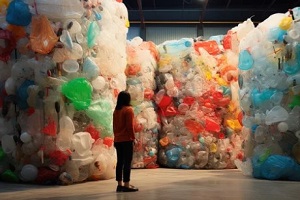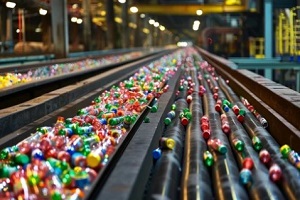July 22, 2024

In observance of the 2024 Earth Day theme: “Planet vs. Plastics,” and the focus on reducing plastic production and use, chemical engineers have come forward to discuss plastic-related environmental problems and their efforts to mitigate them.
David Gardner (a chemical engineer focused on sustainability) and Andrea Paulillo (a lecturer at the University College London and co-founder of eLoop — an Italian consulting firm specializing in sustainability) are among the many chemical engineers dedicated to solving the plastic waste problem.
This blog will discuss Gardner’s and Paulillo’s positions on the use of plastics, their efforts in reducing plastic waste, and how other chemical engineers can contribute to a more sustainable plastic economy.
“Don’t demonize the plastic; it’s there for a purpose,” says Gardner while speaking to The Chemical Engineer. He notes its numerous applications in food and drink packaging, construction materials, clothing fibers, electronics, and transportation and says the issue is more of how we use it.
Gardner faults fossil-based production, which results in excessive emissions. He also holds the linear economy responsible for plastic pollution since most materials end up in landfills and oceans, taking up to 500 years to decompose. Here is what he has been actively pursuing.
Gardner’s role in plastic sustainability started at a research center for the electricity sector, where he oversaw cleanups, purification of waste streams, and processes to make the streams reusable.
He realized his efforts were only a band-aid solution; the real solution, he believed, was prevention. Gardner has carried the same philosophy to the plastics industry, advocating for a circular economy to keep plastics in use for as long as possible.
In September 2023, Gardner helped launch the four-year European project called Upstream. The €7-million project is currently focused on removing plastic litter and target contaminants from waterways and wastewater treatment plants, but it will soon venture into the prevention of microplastic formation.
This will involve the development of bio-based and biodegradable plastics for a range of applications. Gardner aims to encourage businesses to embed these products and concepts into their business models.
He also calls on other chemical engineers to ponder the long-term environmental and social impact of their work in their pursuit of profitability, as he believes the two can coexist.
Join our PLASTICS Pulse newsletter today to receive updates on within the plastic industry while staying informed & connected.
Andrea Paulillo agrees with Gardner that demonizing plastic is not the solution to the plastic pollution crisis but rather redesigning plastic materials and processes. Like Gardner, Paulillo has a deep background in plastic sustainability. He first entered into the arena as a young chemical engineer studying for his Ph.D. at UCL.

Paulillo has long been involved with sustainability work throughout his professional life. As a researcher, his job mostly revolved around understanding the life cycle of plastics as well as the environmental and economic performance of plastic products and technologies.
This helped him identify areas for sustainability interventions. Paulillo also collaborates with Massimiliano Materazzi, another chemical engineer at UCL who specializes in waste management technologies.
They are working with other companies to research effective ways of converting waste into useful products. Their research is aimed at reducing the amount of non-recyclable plastic waste in landfills.
They have developed various technologies, such as waste-to-energy and waste-to-hydrogen with the former regenerating waste into electricity or heat. The latter, which is relatively new and more exciting, produces hydrogen fuel from waste.
Paulillo’s work with eLoop involves helping companies and institutions become more sustainable by assisting them in understanding, assessing, improving, and communicating their sustainability performance.
eLoop’s services include:
While there may be differences in their specific approaches, there is a consensus among chemical engineers that plastics aren’t inherently problematic; it’s the way we use and dispose of them that must change.
A subset of these specialists, including Gardner, is working toward a circular economy. Others, such as Paulillo, are at the forefront of developing new ways to repurpose plastic waste.
Plastics are mostly about polymer chemistry, material science, and process engineering, all within the purview of chemical engineering. Below are ways chemical engineers can improve the plastics economy and advance their careers:

Are you a chemical engineer, plastics or equipment manufacturer, supplier, or recycler aiming to advance plastic sustainability? The Plastics Industry Association has the resources to support you. We provide networking opportunities with industry experts and companies working towards a sustainable plastics economy. Join the Plastics Industry Association today to be part of the solution to plastic pollution.
PLASTICS and the Future Leaders in Plastics (FLiP) Committee are devoted to supporting and encouraging the next generation of plastics leaders who will play a crucial role in the innovation, technology and future of the plastics industry. FLiP’s mission is to provide young professionals under the age of 40 the exposure, education and resources they need to build lifelong careers in plastics. Want to join? Want to get your employees involved? Email: [email protected]